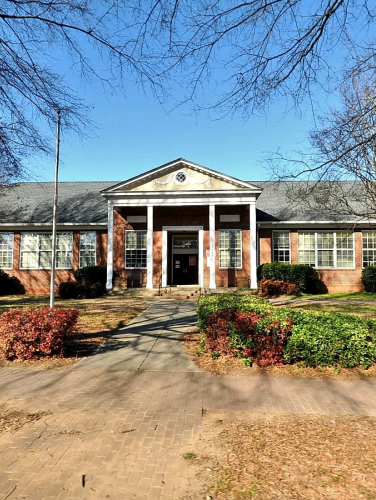
Midwood Elementary School
(ca. 1935)
A Depression-era PWA-funded school that served the Plaza Midwood community for more than 75 years.
1817 Central Ave., Charlotte, NC 28205
Opened in 1935 as Lawyers Road School, Midwood Elementary School served generations of students from the Central Avenue corridor (later known as Plaza Midwood) until 2011. Designed by the firm of Charlotte architect Marion R. Marsh, the school reflects the city’s early-to-mid-twentieth century growth pattern as a series of streetcar suburbs located near downtown. The school closed in 1983 after decades of declining population and deteriorating neighborhood conditions. Repurposed in 2013 as the Midwood International and Cultural Center, the building has since been used by various community and non-profit organizations.
Property Quick Links
Plaza Midwood’s original neighborhoods – including Oakhurst, Logie Avenue, Forest Circle, Chatham Estates, Club Acres, Midwood, and Johnston Courts – did not develop as quickly in the early 1900s as Charlotte’s other streetcar suburbs like Dilworth and Elizabeth. Bisected by the heavily trafficked Seaboard Air Line Railway line, the Central Avenue corridor offered only sporadic streetcar service and indirect access to downtown. Residential development grew as the automobile became more affordable for middle-class Charlotteans, increasing the number of households and the need for more schools. But the Great Depression left the county’s board of education financially strapped. In September 1933, the newly-created Charlotte city school district secured federal funding from the Public Works Administration to build and expand six schools, including Lawyers Road School. The School Board commissioned Charlotte architect Willard G. Rogers to design the new eight-room school. But in an apparent cost-cutting effort, the Board instead adopted Marsh’s already-completed Traditional Revival designs for the contemporaneously developed six-room Eastover Elementary School, modifying that design to add two more classrooms and tapping Rogers to manage the construction on property purchased from E.A. Cole, a founder and executive of the Cole Manufacturing Company.
The community’s elementary-aged students already exceeded the school’s capacity when it opened for the 1935 school year, necessitating the addition of two classroom wings and a new auditorium by 1942 for the newly renamed Midwood Elementary. Another 1948 expansion included a new cafeteria and more classrooms, but ongoing overcrowding through the early 1950s finally prompted the construction of new schools. At its peak in the 1950s, Midwood Elementary had 1,000 students. As residential development spread beyond Plaza Midwood, the school’s enrollment declined to under 300 students before its 1983 closure. The building was later used as a food distribution site for the county department of social services, a temporary location for students of the fire-damaged Albemarle Elementary School, the home of the Dolly Tate Teen-Age Parents Services School, a preparation site for meal programs for elderly Mecklenburg County residents, and Midwood High School. Repurposed in 2013 as the Midwood International and Cultural Center, the building’s primary tenants were the International House, an organization encouraging cultural diversity and immigrant acceptance , and the Light Factory Contemporary Museum of Photography. Conformity Corporation purchased the building in October 2021.

